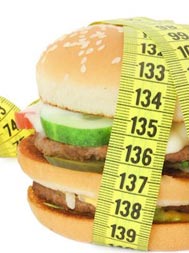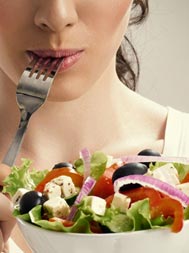| January 2017 | Hotlunch.com | 1-888-376-7136 |
[Volume 9, Issue 1] |
|
|
| |
| Costly Foods Seen as More Healthful |
|
|
A lot of junk food is cheap so regular more healthful food may be seem expensive by comparison. That’s nothing new, but another possible step is to then associate the cost of food with perceived heath benefit. Is more expensive food always better for you?
Healthful food perceptions influenced by price
http://www.medicalnewstoday.com/articles/314901.php
This news story from MNT describes findings from a study done by Ohio State University researchers. The study team tested people’s perceptions of cost and food benefits in a series of experimens and they found strong associations with higher prices and beliefs in more benefit. On top of that the researchers say people not only believe healthier foods are more expensive they choose foods based on that notion.
But, in reality, price isn’t the best way to determine if food is healthy. Check out the nutrition labels and ingredients lists to know what food is the best for you and your family. |
|
|
|
| |
| Is Sustainability the Next Food Trend? |
|
|
|
Interest in sustainability has been growing over the past decade and some experts believe it will become a big trend in foods and nutrition this year. But what does sustainability mean when it comes to diet and the foods you eat?
Nutrition experts predict sustainability ‘most important’ trend for 2017
http://www.foodnavigator-usa.com/Manufacturers/Nutrition-experts-predict-sustainability-most-important-trend-for-2017
This news story published by Food Nagviator USA describes what may be in store for sustainability and nutrition. Eating sustainable foods is good for the environment and for our health since sustainable foods tend to be healthier foods.
What You Can Do: |
- Plant based foods require less farmland and resources than meat production.
- Plant based foods are better for you health. You don’t need to become vegetarian, but adding in more plant based foods is beneficial.
- Avoiding waste is important too. Americans waste a lot of food when it’s tossed in the trash. That’s a waste of money and resources.
|
|
|
| |
What Exactly Is 'Clean Eating?' |
|
|
Maybe you’ve heard about eating clean. It sounds like it must be good, but what does it mean? For the most part, eating clean means not eating junk foods and overly processed stuff. But, there’s no official definition so it can mean different things to different people. And that’s okay.
‘Clean eating’ is a fuzzy term — and that’s why it works
https://www.washingtonpost.com/lifestyle/wellness/
This news story from The Washington Post makes the case for clean eating and why a distinct definition isn’t necessary. One person’s clean eating includes lots of local fresh fruit and vegetables and nothing processed at all. Another person’s clean eating mean organic foods. I like the idea of eating clean when it’s realistic and includes lots of good foods, but I don’t like I when it turns into a fad.
And on that note: |
|
|
|
|
| |
| Forget the Fad Diets |
|
|
|
It’s good to make dietary changes when you need to eat a healthier diet. There are several ways to do that, including following one of many fad diets. They’re tempting to follow when it seems like all your friends are doing it. Or did do it. People rarely follow fad diets long term. But the best way is to follow healthy time-honored advice.
Nutritionists urge consumers to forget fads, follow sensible advice
http://www.weeklycitizen.com/news/20170108/
The best way to eat healthy is to follow the advice put forth by most dietitians. Cut back on the sugary and high-fat foods, watch your overall calories, eat more fruits and veggies and choose more fish and less red meat.
Healthy eating tips: |
- More fruits and veggies – eat salads, colorful side dishes with lunch and dinner, and fresh fruits with breakfast or as snacks.
- Less red meat and more seafood, legumes or lean poultry
- Don’t forget about calcium sources, such as dairy and fiber-rich whole grains.
- And remember there are no quick fixes – good dietary habits can last a lifetime, but they may take a little practice.
|
|
|
| |
| How to Dine Out and Eat Healthy |
|
|
It’s usually not easy to eat healthfully when you’re at a restaurant. The portions are huge, the calorie counts are high and usually the food is loaded with fat, sugar and sodium. If you don’t eat out very often it’s not a big deal but if you dine out frequently it’s important to try to choose healthier foods regularly.
Yes, it’s possible to dine out and eat a healthful meal. Here’s how.
https://www.washingtonpost.com/goingoutguide/
This news story from The Washington Post offers some simple stratagies for eating right when you’re at a restaurant. Great tips include looking up the menu before you go. Most restaurants have their menus on line. Also, if portion control is a problem, it helps to not order everything all at once. Order an appetizer or soup and eat it before ordering your entrée. You may find you don’t even need it. |
|
|
|
| |
| About HotLunch.com |
|
|
|
Hotlunch.com is the only web-based system of its kind. Take a look at these testimonials to see how Hotlunch.com made an impact for these schools.
http://hotlunch.com/testimonials.html |
| |
| NEW AND IMPROVED VERSION 2.0! |
-
With Hotlunch.com you can publish lunch menus online, receive payments and automate administration of your Hotlunch at school.
-
Hotlunch.com has been used by schools all over the nation to manage after school care, volunteer recruitment, capital campaigns and much more!
-
Manage multiple schools, nutrition information, reduced fee lunches, inventory and much much more
-
Faster Reports, and easier access, you can be up and running in less than an hour.
- Ask us how today. Call 1-888-376-7136 or email [email protected]
|
|
|
| |
| Like us on Facebook |
|
Hotlunch.com has expanded our online presence to Facebook. The new Hotlunch.com Facebook Page will provide you a wealth of information and updates on School and Children’s nutrition. |
|
 |
|
| |
| ainiti - Empowering underprivileged girls in undeveloped countries |
|
Hotlunch.com is giving back to underprivileged girls
Check out the progress we have made at www.ainiti.org
Please ask us how your school can help, email [email protected] |
|
 |
|
| |
| More About School Lunches, Nutrition and Healthy Kids |
|
| |
Learn to Love Your Food
http://www.foodandnutrition.org/Stone-Soup/January-2017/Learn-to-Love-Your-Food/
Here’s Even More Evidence That Fish Oil Is Good for You
http://time.com/4619488/omega-3-fats-heart-health/
How to Get College Students to Eat Healthier
http://www.wsj.com/articles/how-to-get-college-students-to-eat-healthier-1484324984
Daily Folic Acid Supplementation Remains Important for Prevention of Birth Defects
https://www.sciencedaily.com/releases/2017/01/170110133536.htm
Can School Staff Improve Health of Low-Income Kids?
http://www.medpagetoday.com/pediatrics/obesity/62491 |
| |
| About Shereen Lehman |
|
Shereen Lehman is a health and nutrition writer with two decades of experience counseling people on nutrition and diet. She has a master's degree in human nutrition and is a member of the Academy of Nutrition and Dietetics and the Association of Health Care Journalists.
Shereen writes about nutrition for the large website About.com (http://nutrition.about.com), is co-author of Superfoods for Dummies (http://www.wiley.com/WileyCDA/WileyTitle/productCd-0470445394.html) and Clinical Anatomy for Dummies (http://www.wiley.com/WileyCDA/WileyTitle/productCd-1118116437.html). |
| |
|
















